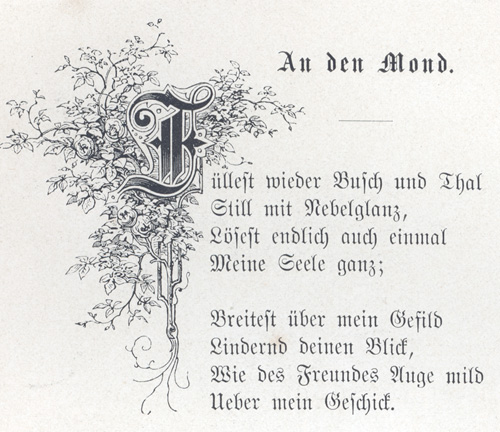The German Club is one of the best things that ever happened to Bard College Berlin, simply because it’s the only place other than our German language classes, where we, without any shame or guilt, assert our imperfect knowledge of German. Initiated last year by second year student David Kretz, the German Club hosts a small event every week related to the German language or culture. The Club has had some permanent members––people who show up dedicatedly to each and every event, like Katharina Meyer, Director of the Provost’s Office.
The Club has had many memorable gatherings, but one of the most unforgettable ones for me was the “poetry night” that took place on the 21st of November, on which we got together to read beautiful, and at times, intense German poetry (both in German and in translation). We started off with Katharina Meyer’s choice: “Die Füße im Feuer” / “The Feet in Fire” by Conrad Ferdinand Meyer, a poet who, even though the name suggests it, is not related to her in any way. The poem engaged us with the theme of revenge and forgiveness. It is about a man who tortured another man’s wife (for three years) as she was trying to protect her husband from him. The woman’s loyalty to her husband subjects her to severe punishment from the man looking for her husband. Gradually the poem shows the darkness lying in the heart of this man and the guilt he begins to harbor as a result of his atrocities. Yet as he finds himself again among the people who had witnessed the death of that woman, they forgive him and state that their revenge lies with God.
We then moved from the lofty themes of revenge and forgiveness to the read Veronica Marcinschi (a third-year BA student) had chosen––the beautiful “An den Mond” or “To the Moon” by Goethe. The poem touches upon the lonely human heart and its yearning for worldly desires which yet recoils back into itself and finds solace in the silence of the nature. We then heard the most beautiful piece of the day in my opinion, “Kindergeschichte” or “Children Story” by Peter Handke. Mathujitha Sankaran, the senior student who read this poem, informed us that its verses appeared in the opening of a movie that she had recently seen. The poem shed light on the theme of childhood and, in particular, how children view the world.
Then it was my turn. I read a Goethe poem in my hesitant German accent. Goethe is a popular poet in Pakistani culture as he invested a lot of his time researching Oriental cultures and religions. I had often heard about him as a poet who bridged the two worlds together during German Romanticism. The poem I chose, “So laßt mich scheinen, bis ich werde” or “Let me appear, until I become,” I would consider one of Goethe’s difficult poems, as it addresses a lover or a seeker of enlightenment whose quest is for truth and love. Although difficult to grasp, Goethe’s poem seems to clearly hint at one thing––at a higher truth, which cannot be easily comprehended by any human being.
David Kretz then brought out in contrast to the prevalent tone of the evening the proletarian voice of the Brechtian poem “Fragen eines lesenden Arbeiters” or “Questions of a Worker.” After we dealt with the woes of the proletariat, we engaged with the woes of a lover. And that was all that was missing––a short, simple and sweet love poem, that eventually brought us to the end of our German Poetry Night. The evening ended as we read Hermann Hesse’s “Stuffen” / “Steps” and as we all prepared to leave the dimly lit, warm and cozy room of the Student Center, we all hoped for many more similar Poetry Nights to take place at Bard College Berlin.

